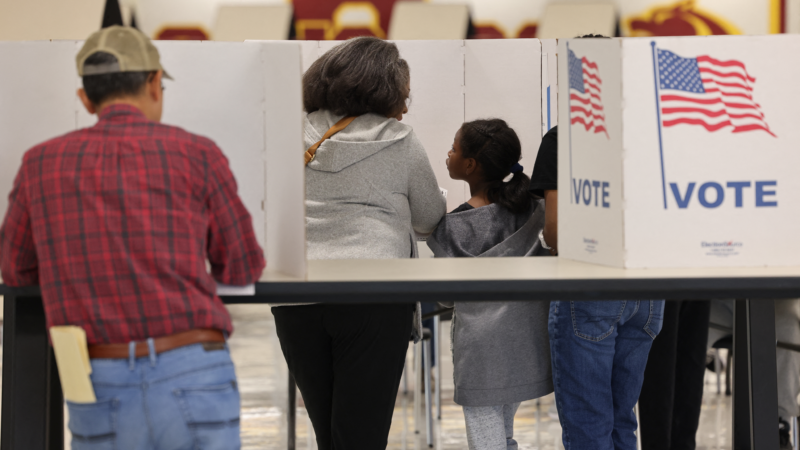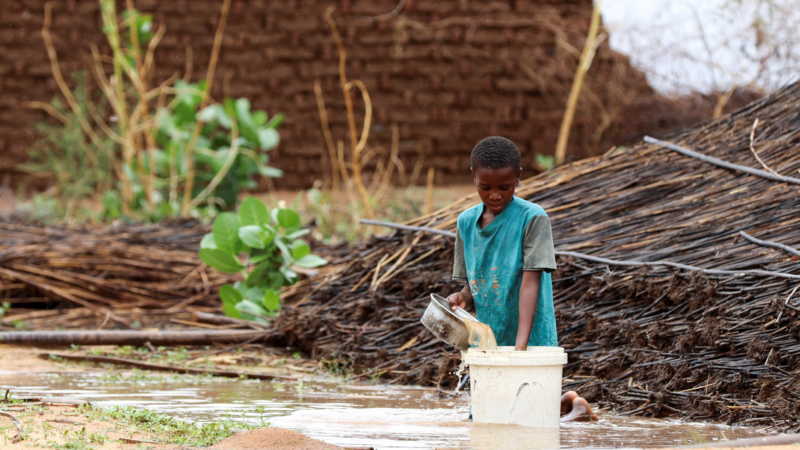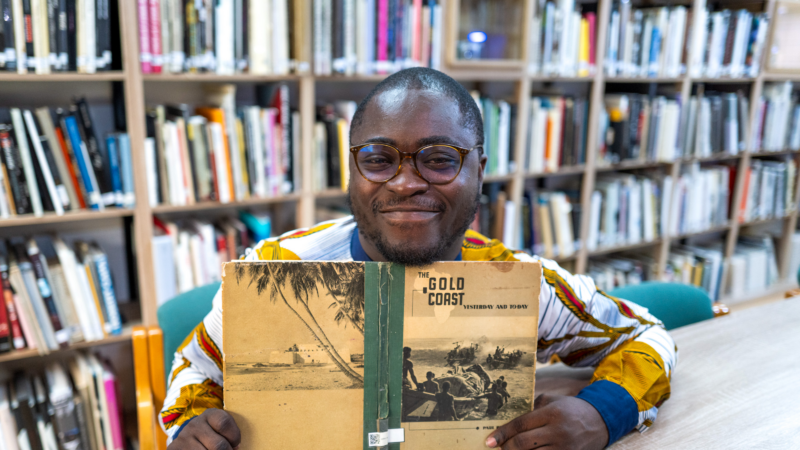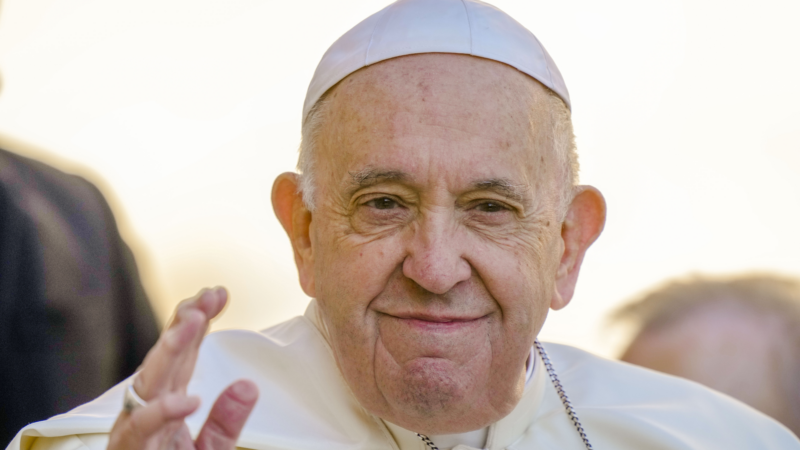‘Dad, is the world going to end?’ How to talk to your kids about the election
After Donald Trump won the presidential election, Eddie Slaughter, 37, a barbershop owner, and Trump voter, in Dunedin, Fla., was celebrating. Slaughter is also a father of four. His two older kids, who are 11 and 13, had a different reaction to the results. They came to him expressing uncertainty.
“The questions were like, ‘If Trump becomes president, Dad, is the world going to end?’ ” Slaughter recalled. He believes social media may have fed into the anxiety. “I think my kids are very concerned about stuff that happens on TikTok,” he said.
The election season that saw deepening divides and mounting stress to the point of becoming toxic has ended with Trump’s election. But the stress has not ended. And some are still struggling not only to talk with each other about what happened and what’s ahead, but parents, especially, are grappling with how, and even whether, to loop in the littlest listeners about the election.
And they are listening.
Kids as young as age 5 “are vibing off of what they’re feeling in the environment and what they’re feeling probably from us, too, as parents,” said Dr. Janine Domingues, a senior clinical psychologist at the Child Mind Institute in New York.
She said kids can pick up on political stress from school, social media or television. “And, so, to not name it and not talk about it actually can increase or heighten the anxiety,” Domingues said. She is hearing about election-related stress among her young patients. “I see definitely a level of anxiety, for sure,” she said.
It’s up to parents to start the conversation
Because kids might not necessarily be conveying those anxieties, it is up to parents, or caregivers, to start the conversation, Domingues said. Doing so without centering themselves can be tricky, said Libby Hemphill, an associate professor of information at the University of Michigan School of Information.
“Maybe we’re sad, maybe we’re excited,” Hemphill said, “depending on where you’re at politically … [But] that’s actually not what your kids need. What your kids are looking for is some reassurance that they’re going to be OK.”
Dr. Sara Brownschidle, 43, a physician from Baltimore County, Md., has three daughters ranging from elementary to high school ages. She voted for Vice President Harris and before the election was called, she and her husband talked about reassuring their kids, whatever the results. Then they got the news, just as the kids were getting ready for school.
“Shortly before they got on the bus, my husband just blurted out that Trump had won,” she said. “I pretty much knew I wasn’t going to be able to hold up my end of the, you know, everything-is-OK bargain. I was already starting to tear up.”
“And I just blurted out, ‘It’s still a really sexist world, and that’s very unfair.’ And that was pretty much all I could get out before I choked up and kind of disappeared into the bathroom,” Brownschidle said.
Stepping away may be the best thing to do for an election conversation with kids, Domingues said, and “modeling how to calm yourself and regulate” can help kids do the same.
When it’s time, let kids take the lead
Then when parents feel ready to talk about what the election means and what’s ahead, kids should take the lead, Domingues said.
For littler kids, as young as kindergarten age, Domingues suggested starting simply, by asking them questions, such as, “How are you feeling about the election?” Or, “What have you learned at school about what this means and what is voting?”
For kids middle-school age and older, Domingues said, parents can ask where the kids, themselves, stand on certain issues and values and where they are getting their information.
Brownschidle said, in her view, Trump’s win represents a grave threat to abortion rights and she wants to be available to answer her kids’ questions honestly. “I guess I’m feeling at this point that all I can do for them is to just keep educating them,” she said.
Slaughter, the Florida barbershop owner, said he cast his ballot for Trump, in part with his kids’ future in mind, “because I am a business owner … And I would love a tax break and so I don’t mind working through the mud of whatever else that people are afraid of.”
He said he aims to keep the channels of communication open with his kids, and do his best to clarify claims they may be hearing on TikTok. For him, that does not mean trying to convince them to support Trump. “I really want for my kids to be free thinkers,” he said. “I don’t want my children to be influenced.”
Heated rhetoric, experts say, can often cool when people talk to each other in smaller spaces, as opposed to online, where the consequences of language may not be immediately apparent.
Remind kids they’re part of a community
Hemphill, of the University of Michigan, suggested reminding kids they are part of a community even if they and their neighbors disagree. An example of the tone could be, “What I’m going to do with that energy is try to get to know my neighbors,” she said. “We still all have to live in community no matter how the election came out.”
For kids who may themselves be learning to be a good teammate, experts say, it can be helpful to think about the election results in sports terms. Being a good winner can be part of those conversations among neighbors.
“When you win, good for you! And also, it was really tight. And not everybody thinks the way you do,” Hemphill said. “There’s a line between a touchdown dance and a taunt.”
Another way to help kids navigate the post-election period is by helping them overcome potential feelings of helplessness, experts say; despite being too young to vote, they can be empowered to enact change.
Hemphill said parents can harness their kids’ passions, assist them in researching an issue, then reaching out to elected officials, via letter or perhaps by attending a city council meeting.
In her case, Hemphill’s 11-year-old son cares about adding more sidewalks in the neighborhood so it’s easier to get to the bus stop.
“So that’s his issue,” Hemphill says. “And so just practicing with your kids … how to channel that into something productive.”
Democracy is an ongoing process, after all.
“And I just keep coming back to how unique it is in America that we get to keep voting and we get to stay engaged and we get to say publicly to our representatives and to our neighbors what we think,” Hemphill said. “And helping [kids] practice how to be heard in a useful and productive way so that when they do have a right to vote, they’re going to use it well, I think is a good long-term project for parents.”
Party City files for bankruptcy and plans to shutter nationwide
Party City was once unmatched in its vast selection of affordable celebration goods. But over the years, competition stacked up at Walmart, Target, Spirit Halloween, and especially Amazon.
Sudan’s biggest refugee camp was already struck with famine. Now it’s being shelled
The siege, blamed on the Rapid Support Forces, has sparked a new humanitarian catastrophe and marks an alarming turning point in the Darfur region, already overrun by violence.
FDA approves weight loss drug Zepbound to treat obstructive sleep apnea
The FDA said studies have shown that by aiding weight loss, Zepbound improves sleep apnea symptoms in some patients.
Netflix is dreaming of a glitch-free Christmas with 2 major NFL games set
It comes weeks after Netflix's attempt to broadcast live boxing between Jake Paul and Mike Tyson was rife with technical glitches.
Big dreams: He’s the founder of a leading African photobook library
Paul Ninson had an old-school, newfangled dream: a modern library devoted to photobooks showing life on the continent. He maxed out his credit cards, injured his back — and made it happen.
Opinion: The Pope wants priests to lighten up
A reflection on the comedy stylings of Pope Francis, who is telling priests to lighten up and not be so dour.







